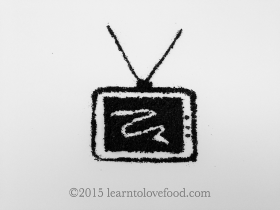
For many families, toys, TV or an i-pad at meals has become an important crutch on which their child’s growth and development hinge. They know their child simply will not eat without a distraction.
For some children, ‘holding out’ and waiting until they get hungry enough to eat works. But for others ‘holding out’ does not work (find a chart on the differences between typical picky eating and Selective Eating Disorder here). These children will starve themselves. Their parents’ fear of taking away distractions at meals and watching their child waste away is real. So, telling parents to just take away TV sets up this battle that’s not helpful for anyone.
It is always a goal, though, to remove distractions from mealtimes. The reasoning behind taking distractions like TV and toys out of eating is simply that we don’t want kids to be distracted from eating. Meals and snacks are huge learning times and if kids are distracted, they may be maintaining the calories they need, but they’re learning to disengage from food rather than engage with it. We want kids to learn from and about food as well as to learn from others at the table during meals.
If distractions are necessary for a child to eat, there are underlying issues with the child’s relationship with food. The distractions have become part of a strategy to make mealtimes work/get a child to eat. The catch-22 is that in order to work on expanding a child’s diet we need them to learn to be present with food.
Once a child can be present with food they can start to learn about it and begin to foster feelings of safety, interest and curiosity about food. It’s great if this can happen at mealtimes, if not, let’s work up to it!
This is where food play comes in. If your child will not sit down with food without a distraction, start doing food play with a favorite food. The first goal of food play here is to just be present with food without the distractions. When your child is comfortable sitting with a food they like, then start working up to new foods during food play.
Once you know your child can sit with foods without distraction during food play, then you can start getting rid of mealtime distractions. Nothing happens overnight. Distractions evolve as a strategy for a reason and it takes time to learn new skills, too. Food play can make the learning less of a mealtime battle!
However you choose to play, have fun and happy food play!


Greetings. Great post. You touched on some important issues. I am a full time nanny for 2 different families. Both families are guilty of distracting their children with tablets, while eating. I have broken both children of this practice while I am on duty but the parents refuse to follow suit. It’s very sad.
LikeLike
Thank so much! It’s great that you’ve shown that the children you work with are able to eat without distractions and that you’re giving those opportunities. It sounds like you’re doing a great job! Often leading by example is the best teaching tool and when others see that another way works as well as what they’re used to, they often come around. Good luck!
LikeLiked by 1 person
A first world problem, but one that takes out all the fun and family out of food. Thanks for a great post.
LikeLiked by 1 person
Very thoughtful post. I also learned a lot from the link on SED. This is a new concept to me but I was definitely able to relate it to various people in my past and now have more understanding of what they were going through.
LikeLiked by 1 person
Thank you! I’m so glad you enjoyed it and found it helpful!
LikeLike
Great post… again
LikeLiked by 1 person
Thank you! 🙂
LikeLike
This is wonderful advice! Having worked with an occupational therapist since my son was still a little baby, I admire your insight. He has bigger feeding issues, but we’ve still had to minimize how many distractions we provide or he could easily become dependent upon them. I will definitely be following!
LikeLiked by 1 person
Thank you! It’s so nice to hear my words resonated with you! 🙂
LikeLiked by 1 person
Reblogged this on Never Less Than Everything and commented:
This is one of my absolute favorite food blogs. Not only are there just so many awesome ideas and activities for food play, a really awesome and fun approach to de-weird unfamiliar foods, add sensory, take stress out of mealtimes, and encourage creativity! If you have a picky eater it’s a must follow! It is written by a speech-language pathologist who specializes in pediatric feeding therapy who, in addition to being a really knowledgeable resource, is also really lovely and talented!
LikeLiked by 1 person
Wow–thank you so much!! I really appreciate your kind words and support! 🙂
LikeLiked by 1 person
NO thank you. I love your blog – and the quail today is adorable!
LikeLiked by 1 person